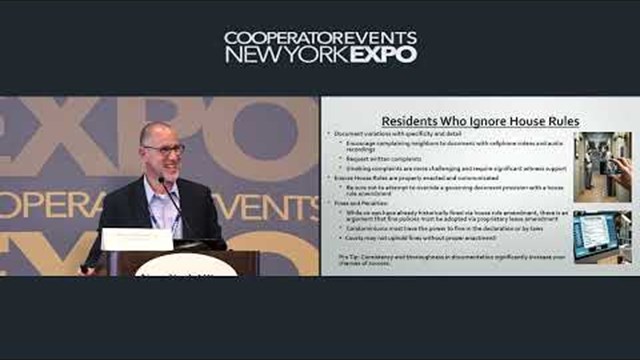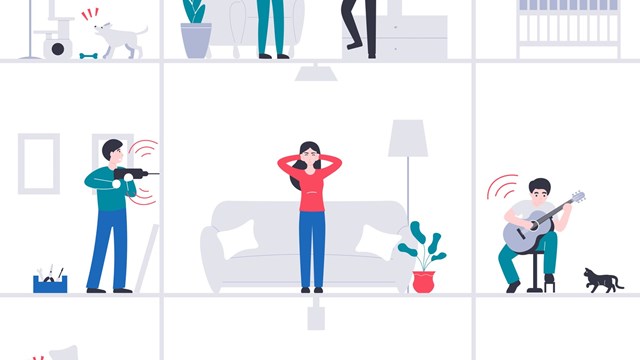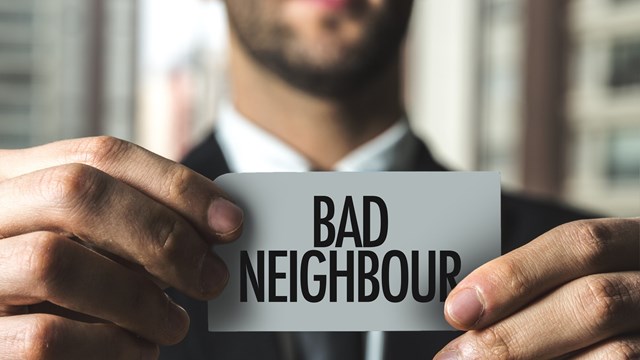The vast majority of co-op and condo residents are regular folks who wouldn’t dream of disrupting life in their building by being verbally abusive to the neighbors, blowing up board members’ phones and email inboxes with endless complaints and threats, or filing lawsuits at the drop of a hat for every slight, whether real or perceived. Unfortunately, there are some shareholders and owners who seem to thrive on drama and dissent and they can make life miserable for neighbors, board members, and managers alike.
Defining ‘Difficult’
We’ve all had a neighbor we’re not crazy about—or someone in our building or association who has never had a nice word to say about anyone or anything. But are those people truly problematic, or just an annoyance? “Someone becomes a difficult resident when there is a threat to the safety, well-being and health of another resident, or if there is physical damage to the building,” says attorney Steve Troup, a partner with the law firm of Tarter Krinsky & Drogin, which has offices in New York and New Jersey.
For several months, Dan Wollman, chief executive officer of the management firm Gumley Haft in Manhattan, had been dealing with one particular resident who had repeatedly claimed that someone is climbing on her terrace and vandalizing her property. Management took valuable time to check on her claims, but according to Wollman, had not found any proof of her allegations.
“The gate to her terrace is locked, and we have cameras on the fire stairs and on the doors that access the roof, so we would know if anyone got up there,” says Wollman. “Handling a difficult resident is like going to therapy. You have to be understanding and validate their feelings and let them know you are going to try and get to the bottom of it.”
John Van Der Tuin, an attorney with the Manhattan-based law firm of Balber Pickard Maldonado & Van Der Tuin, PC, says that the most common difficult resident issue he hears about is noise—electronics, dogs, playing children, and domestic disputes. “Second is either smoking, or personal insults or verbal abuse of neighbors or building staff,” he says.
Drawing a Line
What might seem like innocent day-to-day complaints from one resident can easily disrupt a community if they’re perpetual, or petty, or both. Building staff may be pulled from one job responsibility to handle unnecessary claims, or management may get bogged down with the time-consuming responsibilities of answering repetitive emails and phone calls.
“How a difficult resident is handled is largely a matter of degree, and whether the conduct is merely unpleasant, demanding or uncompromising or if the conduct interferes with the ability of other residents to use their apartments, is verbally or physically threatening, or does physical damage to the building,” says Van Der Tuin.
On a day-to-day basis, Van Der Tuin explains that it is the managing agent’s responsibility to deal with all residents, demanding or otherwise. “Board members have their own lives—they’re volunteers, not social workers. However, if there is a continuing problem that is not being resolved at the management level, it is in the interest of the board and building for one or two board members to intervene, try to meet with the troublesome resident and understand the problem and seek a resolution so the problem does not fester and escalate.”
If, however, the resident may have mental health or aging-related issues (such as dementia, for example) which are causing their actions, management may have to turn to other sources for assistance. “The actual goal may be to simply impose some conditions on the resident’s continued occupancy, such as medical care and medications, hiring of a home health aide or discontinuing gas service,” he says.
Wollman advises management to look for any family members or other friends or acquaintances in the building who are familiar with the resident. “If management has no one to turn to, they should contact Adult Protective Services,” he says. “But that’s really a last ditch effort. Ultimately, you want to handle this in a professional way that is not too intrusive to the person and allows them to maintain some level of dignity.”
Susan Birenbaum is the founder of Humanittude and a certified aging life care manager and a licensed clinical social worker (LCSW) by the state of New York. Once she was hired by the board to tend to an 82-year-old resident who had been living in the building since the 1960s.
“He was a well-liked tenant, but his partner died and the board said he could bring in a roommate,” she says. “But his dementia was advancing, and he got stiffed by the roommate. He wasn’t paying his bills.” Things deteriorated further from there. “He was feeding food to the pigeons on the window, which caused smells in the rooms,” Birenbaum continues. “One day he was in the lobby without any pants because they were wet.”
Fortunately, the resident had family nearby; Birenbaum reached out to them, and worked with them to help the resident move into a nursing facility that was equipped to care for him.
In another case, Birenbaum was called in to help with two residents battling over cigarette smoke. “The daughter of a resident moved in, but was a smoker,” she says. “It was difficult because that shareholder smoked and the other shareholder says that it caused the loss of conjugal visits with his wife because the bedroom stunk. The non-smoking shareholder ended up selling his units.”
When a problem arises, she recommends that management pick up the phone and see what they can do to solve it. “What is the issue?” she asks. “Let them know that you will discuss it with the board and get back to them with an answer. The residents should also write to the board outlining their complaints.”
When faced with anything like the situations above, Birenbaum performs an assessment on the resident in question and then determines a course of action. “We talk to the doctor sometimes too and determine an alternate living situation if they cannot live there,” she says.
Last Resorts
Once the management has exhausted all of their resources in a situation like this, including contacting adult social services, Van Der Tuin says that the board and management’s obligation is to take the same steps and treat the problem resident no differently than any other resident of the building, even if the resident is difficult or unpleasant.
If a friendly letter to the resident doesn’t resolve the issue, “They turn it over to me and I send a letter that talks about the terms of their lease,” says Troup. “Whatever the problem is they will get 30 days to cure it.” If they’re unable or unwilling to, “The board would then have the right to terminate their lease.”
Van Der Tuin explains that cooperative boards have more, and more effective, formal legal powers to curb disruptive residents. “In co-ops, specific disruptive behavior can be the subject of a lease default notice—and termination and eviction if the disruptive conduct is not abated. Broader disruptive conduct can be the subject of an ‘objectionable tenancy’ vote and termination by either the board or the shareholders,” he says. “Condominium boards have no comparable powers. They can impose limited monetary fines for disruptive conduct, but then have difficulty enforcing or collecting the fines—or they can commence a lawsuit to enjoin the disruptive behavior, but that can be expensive and protracted.”
What the board can and cannot do legally depends on the terms of the proprietary lease (for a co-op) or bylaws (for a condo) and federal, state and city human rights laws. “If the conduct of one of the disputing residents rises to a level that triggers a board obligation in the bylaws or proprietary lease, or that creates condition—noise, odors—that would violate the warranty of habitability in a co-op, the board is obligated to take action,” says Van Der Tuin. “The board may wish to consult with counsel as to whether it is better, tactically, to initiate action or to wait and defend an action commenced by one of the disputing residents.”
If the difficulty is arising because two tenants are locked in a dispute, Van Der Tuin advises the board to proceed cautiously. “Generally, I’d advise them to work it out between them, and if the board is going to get involved, be sure it understands both sides of the story first,” he says. “However, if it’s one resident who’s having conflicts with multiple other residents and/or staff, it is easier for the board to conclude that it should intervene and focus on what the resident is doing.”
If the board does not intervene, Van Der Tuin says that doesn’t necessarily mean that the board is exposing itself to liability. “Unless the loose cannon resident is creating conditions that are contrary to the board’s obligation under the lease or bylaws or, for a co-op, the statutory warranty of habitability,” he says. “Good boards/managers intervene early on and with discussion or correspondence, rather than formal notices or demands, to try to address disputes/demands and set standards before problems escalate. Litigation should be a last resort rather than a first impulse.”
Learning how to deal with difficult residents isn’t an on-the-job training situation. The Council of New York Cooperatives & Condominiums (CNYC) runs frequent training sessions and seminars on this very topic, and the New York City Bar Association sponsors a co-op/condo dispute mediation process. “My firm, and I’m sure others, counsels board and managing agents, and will provide informal education sessions to assist them in dealing with these issues,” says Van Der Tuin.
Difficult residents happen even in the most well-behaved of buildings. Putting a preventative plan together to handle the situation should it arise is the best way to stay on top of it and prevent it from escalating into something uncontrollable.
Lisa Iannucci is a freelance writer and a frequent contributor to The Cooperator.










Leave a Comment